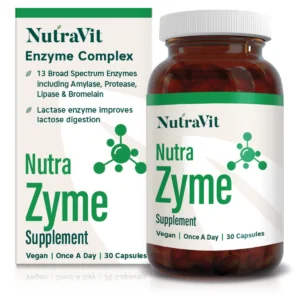Bloating, gas, heartburn, stomach cramps…most of us have suffered these at one time or another. Often, it’s because we’ve eaten something that doesn’t agree with us or we’re feeling under par. In many cases though, gastrointestinal symptoms like these can be down to poor digestion.
And that in itself can lead to malnutrition and chronic conditions.
Happily, one way to help our body digest and get the most nutrients from our food is to give it a hand by supplementing with digestive enzymes.
What are digestive enzymes?
Our body already has a certain number of digestive enzymes. These are actually proteins which break down food, helping us to digest it better and to get the nutrients our body needs from it.
These enzymes are located at different points in the digestive tract. For instance, certain enzymes are present in saliva in the mouth. Other enzymes are produced in the stomach, pancreas and small intestine. The main ‘enzyme maker’ though is the pancreas. It’s here that the enzymes to break down proteins, carbohydrates and fats are made.
Main digestive enzymes
The important digestive enzymes produced in the pancreas include:
- Amylase tackles complex carbohydrates. A lack of this enzyme could result in diarrhoea
- Protease is for proteins. Not making enough of this enzyme can result in allergies.
- Lipase breaks down fats. A lack of lipase means a deficiency of vitamins A, D, E and K for starters.
Digestive enzymes made in the small intestine are ones you may already be familiar with, such as:
- Sucrase breaks down sucrose from sugar and fructose from fruit.
- Lactase to tackle the lactose in milk products. Lactose intolerance is a pretty common condition these days, where people avoid yoghurts, cheese etc because of uncomfortable symptoms.
Foods with digestive enzymes
Some foods naturally contain digestive enzymes, which means eating them can help with poor digestion. These include avocados, kefir, sauerkraut, kiwi, mangoes, bananas, and pineapples. Ginger and honey too have been shown to be beneficial in this sense.
This doesn’t mean though that you should concentrate on eating the above foods to the exclusion of other foods. That’s because a well-rounded diet with fruit, veg, lean proteins and whole grains is best for the body and its digestion. Cutting back on fatty, fried foods will also help.
Supplementing with digestive enzymes
Supplements can mimic natural digestive enzymes when taken before food. They can break down the fats, proteins and carbohydrates in the foods just eaten, allowing the nutrients to be absorbed via the walls of the small intestine.
Our NutraZyme supplement contains up to 13 digestive enzymes to help your body cope with breaking down proteins, carbohydrates, fats and starches. It also helps the body tackle lactase for those with a dairy intolerance.
The enzymes present in NutraZyme include the important amylase, protease and lipase, as well as the anti-inflammatory bromelain to soothe the digestive tract and papain to tackle tough proteins.

Symptoms of poor digestion
Earlier we mentioned certain gastrointestinal symptoms of poor digestion. Other include gas, bloating and oily bowel movements. It can even result in weight loss due to malnutrition. None of these are pleasant and if they persist it may be time to visit your GP.
Are digestive enzymes similar to probiotics?
Probiotics also work on the digestive system, but in a different way to enzymes. The former add to the good bacteria in the gut and in doing so, ensure that the digestive tract is free of toxins and other invaders that would potentially compromise digestion. However, the mix up can arise from the fact that the symptoms of too much bad bacteria in the gut can be similar to that of a lack of digestive enzymes ie gas, bloating, stomach cramps etc.
 FREE UK DELIVERY ON ORDERS OVER £20.
FREE UK DELIVERY ON ORDERS OVER £20. WORLDWIDE SHIPPING AVAILABLE
WORLDWIDE SHIPPING AVAILABLE
